knowledge and wisdom 中英对照
Knowledge and wisdom
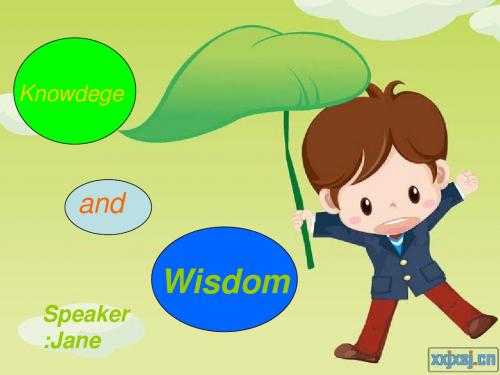
4.They failed in their attempt to reach the North Pole.他们试图到达北极,但失败了。
1.Vt. a .促进,推动;b.促销,推销 c. 提升, 晋升
2.同族:promotable adj. 可提升的,可推 动的; promptional adj.广告宣传的,推销的; promotion n.提升,晋级;促销活动 ;
Excel 为正是用语,多指在某些好的事
物、技能上超过某人
Transcend 经常意味着达到如此高的
水平以至于其它东西很难与其相比ห้องสมุดไป่ตู้
1.He _________ his colleagues in computer skills. 2.The population of the city has __________two million. 3.Men do not________ in all spacial tasks. 4.People should ___________themselves’ limits on and on . transcend excel Answers: exceeded surpasses
b.攻击,进攻;冲击,克服 an attempt on his life企图谋害他 an attempt on the world record 冲击 世界记录
Eg.
1.She was accused of attempted murder .(=She tried to murder sb. but didn’t succeed.)她被控意图谋杀。 2.Don’t attempt to make him change his mind .别想使他改变主意。 3.The thief made no attempt to to run away .窃贼并未试图逃跑。
Knowledge-and-Wisdom原文及翻译

Knowledge-and-Wisdom原文及翻译Knowledge and wisdom are two distinct concepts。
although they are often used XXX。
experience。
and research。
It is the n of facts。
data。
and n that a person gains over time。
On the other hand。
wisdom is the ability to apply knowledge to make wise ns and judgments。
It involves the use of critical thinking。
good judgment。
and common sense.In today's society。
XXX。
People with knowledge are often XXX。
They are the ones who hold important ns in society and are often well-XXX。
knowledge alone is not enough。
It is important to have wisdom to be able to use that knowledge effectivelyXXX.XXX in life。
they learn to apply their knowledge in a practical way。
They learn from their mistakes and successes。
and develop a sense of what works and what doesn't。
However。
wisdom can also be XXX。
By taking the time to XXX perspectives。
大学英语Unit6_Knowledge and Wisdom

private need
patience & persuasiveness
Line of thought
• Ending Paragraph: (para 5) essence of wisdom emancipation Impersonal : hard to achieve emotions and physical needs gradual gaining of wisdom
Unit 6 (II)
Line of thought
• Beginning Paragraph: (para 1) correlation no corresponding growth puzzlement necessity
distinction between
purposes
definition + instructions
Unit 6 Knowledge and Wisdom
Bertrand Russell
索 罗 斯 狙 击 香 港
1.先出口術,唱淡一地方的 經濟及股市。 currency speculation
货币投机
2.在外匯市場沽空 當地的貨幣,令匯 價急跌,製造金融 不穩及資金流走的 現象。
3.在股票期貨市場大手沽空獲利。
3. Eat sapodilla
Implication: food therapy
High protein High fiber
Low fat and Low sugar
4. Eat Tang Seng’s flesh
Implication:
• bear in mind the regulations designed for the benefits of human’s well-being • shun evil and do good • Lay down deadly weapons and maintain harmony in society • Foster high moral principles
unit8 knowledge and wisdom
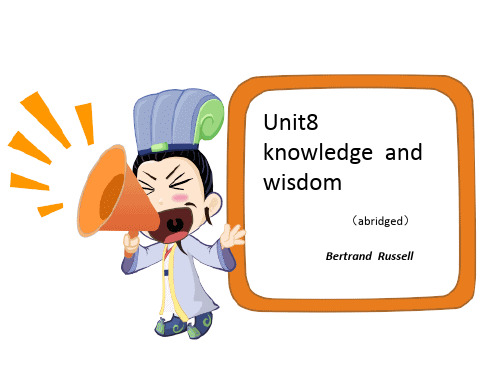
Rhetorical features of the text
Turn to page141
Can you find other examples of parallelism in the essay? Do they have anything in common?
Parallelism
You can go there on foot, by bus or by train. Studies serve for delight, for ornament, and for ability. (Francis Bacon: Of Studies) 读书足 以怡情,足以博采,足以长才。 We can gain knowledge, by reading, by reflection, by observation or by practice. 求知 门径很多,或阅读,或回忆,或观察,或实 践。
Types of Parallel Structures
Word Phrase
Clause
Sentence
She was a woman of mean understanding, little information, and uncertain temper. 她是个智力 贫乏、不学无术、喜怒无常的女人 The letter, short, cold, sharp-tongued, was unexpected. 这封简短、冷淡、挖苦的信,是出乎意外的。
To say i, riding a bicycle is similar to
drive a car. The production manager was asked to write his report quickly, accurately and in a detailed manner.
Unit 6 Knowledge and Wisdom

Bertrand Russell
Three passions, simple but overwhelmingly strong, have governed my life: theloning for love, the search for knowledge, and unbearable pity for the suffering of mankind.
Part 2 - Para 2
Skim and scan paragraph 2 and judge the following statement true / false:
It has become more and more difficult for scientists and technicians to obtain a sense of proportion.
~ yourself ~ expectation
Language Points in Part 1
cease: vi. to stop doing something; n.
The rain has ceased. Without cease cease-fire
Wonders will never cease.(Proverb)
eg. The referee was accused of being ~ ~ sb / sth : having a strong liking for sb / sth
eg. He’s ~ to a glass of brandy after dinner.
Text Analysis
Part 1
三种既简单又极为强烈的激情一直支配着我 的一生:对爱的渴望,对知识的追求和对人类 苦难不堪忍受的悲哀。
Unit8KnowledgeandWisdom课文翻译综合教程三
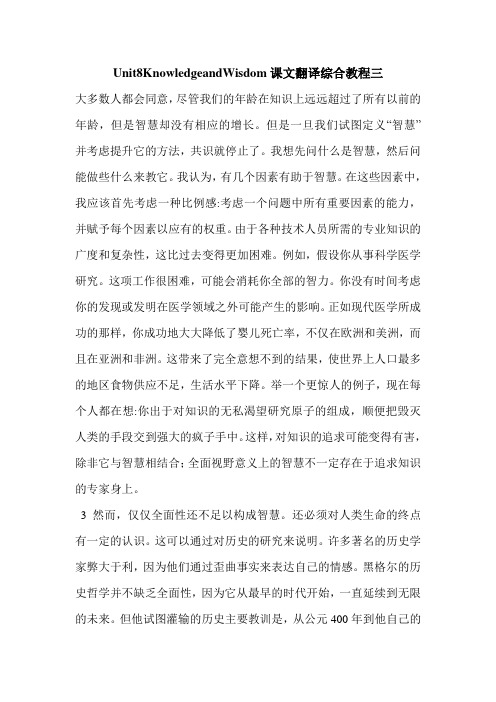
Unit8KnowledgeandWisdom课文翻译综合教程三大多数人都会同意,尽管我们的年龄在知识上远远超过了所有以前的年龄,但是智慧却没有相应的增长。
但是一旦我们试图定义“智慧”并考虑提升它的方法,共识就停止了。
我想先问什么是智慧,然后问能做些什么来教它。
我认为,有几个因素有助于智慧。
在这些因素中,我应该首先考虑一种比例感:考虑一个问题中所有重要因素的能力,并赋予每个因素以应有的权重。
由于各种技术人员所需的专业知识的广度和复杂性,这比过去变得更加困难。
例如,假设你从事科学医学研究。
这项工作很困难,可能会消耗你全部的智力。
你没有时间考虑你的发现或发明在医学领域之外可能产生的影响。
正如现代医学所成功的那样,你成功地大大降低了婴儿死亡率,不仅在欧洲和美洲,而且在亚洲和非洲。
这带来了完全意想不到的结果,使世界上人口最多的地区食物供应不足,生活水平下降。
举一个更惊人的例子,现在每个人都在想:你出于对知识的无私渴望研究原子的组成,顺便把毁灭人类的手段交到强大的疯子手中。
这样,对知识的追求可能变得有害,除非它与智慧相结合;全面视野意义上的智慧不一定存在于追求知识的专家身上。
3然而,仅仅全面性还不足以构成智慧。
还必须对人类生命的终点有一定的认识。
这可以通过对历史的研究来说明。
许多著名的历史学家弊大于利,因为他们通过歪曲事实来表达自己的情感。
黑格尔的历史哲学并不缺乏全面性,因为它从最早的时代开始,一直延续到无限的未来。
但他试图灌输的历史主要教训是,从公元400年到他自己的时代,德国一直是世界上最重要的国家和进步的旗手。
也许可以把构成9智慧的全面性扩展到不仅包括智力,还包括感觉。
发现知识渊博但感情狭隘的人绝非罕见。
这些人缺乏我所说的智慧。
不仅在公共场合,在私人生活中同样需要智慧。
在选择要追求的目标和从个人偏见中解放出来时,这是需要的。
即使是一个如果可以实现就不值得追求的目标,如果它本来就不可能实现,也可能不明智地追求。
data information knowledge and wisdom参考译文
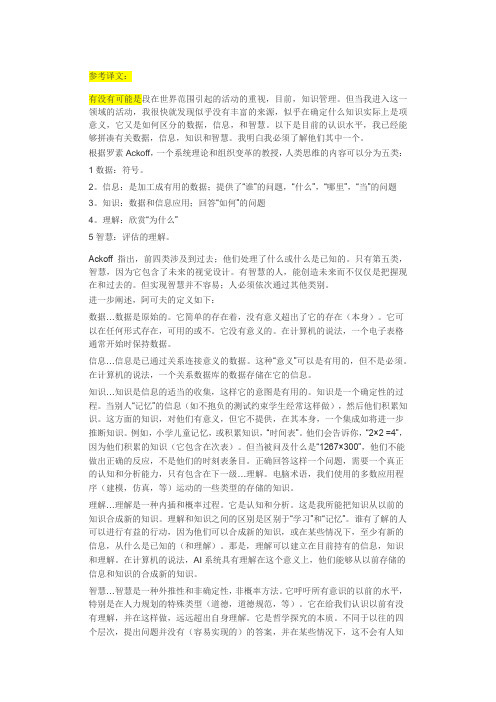
参考译文:有没有可能是段在世界范围引起的活动的重视,目前,知识管理。
但当我进入这一领域的活动,我很快就发现似乎没有丰富的来源,似乎在确定什么知识实际上是项意义,它又是如何区分的数据,信息,和智慧。
以下是目前的认识水平,我已经能够拼凑有关数据,信息,知识和智慧。
我明白我必须了解他们其中一个。
根据罗素Ackoff,一个系统理论和组织变革的教授,人类思维的内容可以分为五类:1数据:符号。
2。
信息:是加工成有用的数据;提供了“谁”的问题,“什么”,“哪里”,“当”的问题3。
知识:数据和信息应用;回答“如何”的问题4。
理解:欣赏“为什么”5智慧:评估的理解。
Ackoff指出,前四类涉及到过去;他们处理了什么或什么是已知的。
只有第五类,智慧,因为它包含了未来的视觉设计。
有智慧的人,能创造未来而不仅仅是把握现在和过去的。
但实现智慧并不容易;人必须依次通过其他类别。
进一步阐述,阿可夫的定义如下:数据…数据是原始的。
它简单的存在着,没有意义超出了它的存在(本身)。
它可以在任何形式存在,可用的或不。
它没有意义的。
在计算机的说法,一个电子表格通常开始时保持数据。
信息…信息是已通过关系连接意义的数据。
这种“意义”可以是有用的,但不是必须。
在计算机的说法,一个关系数据库的数据存储在它的信息。
知识…知识是信息的适当的收集,这样它的意图是有用的。
知识是一个确定性的过程。
当别人“记忆”的信息(如不抱负的测试约束学生经常这样做),然后他们积累知识。
这方面的知识,对他们有意义,但它不提供,在其本身,一个集成如将进一步推断知识。
例如,小学儿童记忆,或积累知识,“时间表”。
他们会告诉你,“2×2=4”,因为他们积累的知识(它包含在次表)。
但当被问及什么是“1267×300”,他们不能做出正确的反应,不是他们的时刻表条目。
正确回答这样一个问题,需要一个真正的认知和分析能力,只有包含在下一级…理解。
电脑术语,我们使用的多数应用程序(建模,仿真,等)运动的一些类型的存储的知识。
unit 6 Knowledge and Wisdom
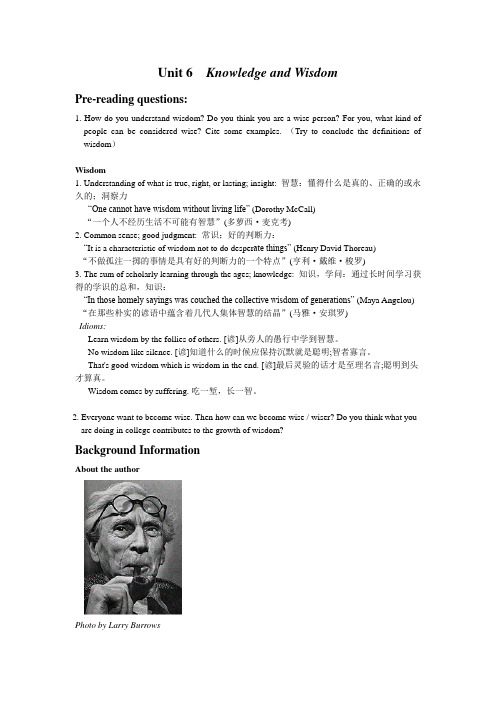
Unit 6 Knowledge and WisdomPre-reading questions:1. How do you understand wisdom? Do you think you are a wise person? For you, what kind ofpeople can be considered wise? Cite some examples. (Try to conclude the definitions of wisdom)Wisdom1. Understanding of what is true, right, or lasting; insight: 智慧:懂得什么是真的、正确的或永久的;洞察力“One cannot have wisdom without living life” (Dorothy McCall)“一个人不经历生活不可能有智慧”(多萝西·麦克考)2. Common sense; good judgment: 常识;好的判断力:“It is a characteristic of wisdom not to do desper ate things” (Henry David Thoreau)“不做孤注一掷的事情是具有好的判断力的一个特点”(亨利·戴维·梭罗)3. The sum of scholarly learning through the ages; knowledge: 知识,学问:通过长时间学习获得的学识的总和,知识:“In those homely sayings was couched the collective wisdom of generations” (Maya Angelou) “在那些朴实的谚语中蕴含着几代人集体智慧的结晶”(马雅·安琪罗)Idioms:Learn wisdom by the follies of others. [谚]从旁人的愚行中学到智慧。
unit8knowledgeandwisdom课文翻译综合教程三
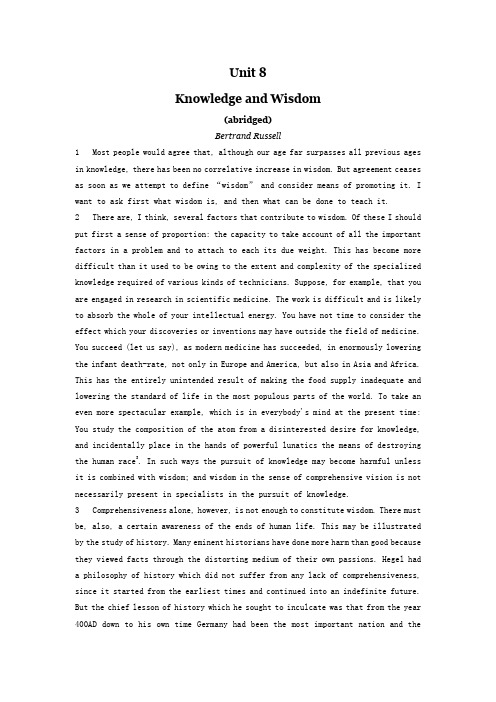
Unit 8Knowledge and Wisdom(abridged)Bertrand Russell1 Most people would agree that, although our age far surpasses all previous ages in knowledge, there has been no correlative increase in wisdom. But agreement ceases as soon as we attempt to define “wisdom” and consider means of promoting it. I want to ask first what wisdom is, and then what can be done to teach it.2 There are, I think, several factors that contribute to wisdom. Of these I should put first a sense of proportion: the capacity to take account of all the important factors in a problem and to attach to each its due weight. This has become more difficult than it used to be owing to the extent and complexity of the specialized knowledge required of various kinds of technicians. Suppose, for example, that you are engaged in research in scientific medicine. The work is difficult and is likely to absorb the whole of your intellectual energy. You have not time to consider the effect which your discoveries or inventions may have outside the field of medicine. You succeed (let us say), as modern medicine has succeeded, in enormously lowering the infant death-rate, not only in Europe and America, but also in Asia and Africa. This has the entirely unintended result of making the food supply inadequate and lowering the standard of life in the most populous parts of the world. To take an even more spectacular example, which is in everybody's mind at the present time: You study the composition of the atom from a disinterested desire for knowledge, and incidentally place in the hands of powerful lunatics the means of destroying the human race3. In such ways the pursuit of knowledge may become harmful unless it is combined with wisdom; and wisdom in the sense of comprehensive vision is not necessarily present in specialists in the pursuit of knowledge.3 Comprehensiveness alone, however, is not enough to constitute wisdom. There must be, also, a certain awareness of the ends of human life. This may be illustrated by the study of history. Many eminent historians have done more harm than good because they viewed facts through the distorting medium of their own passions. Hegel had a philosophy of history which did not suffer from any lack of comprehensiveness, since it started from the earliest times and continued into an indefinite future. But the chief lesson of history which he sought to inculcate was that from the year 400AD down to his own time Germany had been the most important nation and thestandard-bearer of progress in the world. Perhaps one could stretch the comprehensiveness that constitutes wisdom to include not only intellect but also feeling. It is by no means uncommon to find men whose knowledge is wide but whose feelings are narrow. Such men lack what I call wisdom.4 It is not only in public ways, but in private life equally, that wisdom is needed. It is needed in the choice of ends to be pursued and in emancipation from personal prejudice. Even an end which it would be noble to pursue if it were attainable may be pursued unwisely if it is inherently impossible of achievement. Many men in past ages devoted their lives to a search for the philosopher's stone and the elixir of life. No doubt, if they could have found them, they would have conferred great benefits upon mankind, but as it was their lives were wasted. To descend to less heroic matters, consider the case of two men, Mr. A and Mr. B, who hate each other and, through mutual hatred, bring each other to destruction. Suppose you go to Mr.A and say, “Why do you hate Mr. B?” He will no doubt give you an appalling list of Mr. B's vices, partly true, partly false. And now suppose you go to Mr. B. He will give you an exactly similar list of Mr. A's vices with an equal admixture of truth and falsehood. Suppose you now come back to Mr. A and say, “You will be surprised to learn that Mr.B says the same things about you as you say about him”, and you go to Mr. B and make a similar speech. The first effect, no doubt, will be to increase their mutual hatred, since each will be so horrified by the other's injustice. But perhaps, if you have sufficient patience and sufficient persuasiveness, you may succeed in convincing each that the other has only the normal share of human wickedness, and that their enmity is harmful to both. If you can do this, you will have instilled some fragments of wisdom.5 I think the essence of wisdom is emancipation, as far as possible, from the tyranny of the here and now. We cannot help the egoism of our senses. Sight and sound and touch are bound up with our own bodies and cannot be impersonal. Our emotions start similarly from ourselves. An infant feels hunger or discomfort, and is unaffected except by his own physical condition. Gradually with the years, his horizon widens, and, in proportion as his thoughts and feelings become less personal and less concerned with his own physical states, he achieves growing wisdom. This is of course a matter of degree. No one can view the world with complete impartiality; and if anyone could, he would hardly be able to remain alive. But it is possible to make a continual approach towards impartiality, on the one hand, by knowing things somewhat remote in time or space, and on the other hand, by giving to such thingstheir due weight in our feelings. It is this approach towards impartiality that constitutes growth in wisdom.论知识与智慧我们的时代在知识方面远远超过过去所有时代,在智慧方面却没有得到相应的增加,这是大多数人都会同意的看法。
unit8knowledgeandwisdom课文翻译综合教程三

Unit 8Knowledge and Wisdom(abridged)Bertrand Russell1 Most people would agree that, although our age far surpasses all previous ages in knowledge, there has been no correlative increase in wisdom. But agreement ceases as soon as we attempt to define “wisdom” and consider means of promoting it. I want to ask first what wisdom is, and then what can be done to teach it.2 There are, I think, several factors that contribute to wisdom. Of these I should put first a sense of proportion: the capacity to take account of all the important factors in a problem and to attach to each its due weight. This has become more difficult than it used to be owing to the extent and complexity of the specialized knowledge required of various kinds of technicians. Suppose, for example, that you are engaged in research in scientific medicine. The work is difficult and is likely to absorb the whole of your intellectual energy. You have not time to consider the effect which your discoveries or inventions may have outside the field of medicine. You succeed (let us say), as modern medicine has succeeded, in enormously lowering the infant death-rate, not only in Europe and America, but also in Asia and Africa. This has the entirely unintended result of making the food supply inadequate and lowering the standard of life in the most populous parts of the world. To take an even more spectacular example, which is in everybody's mind at the present time: You study the composition of the atom from a disinterested desire for knowledge, and incidentally place in the hands of powerful lunatics the means of destroying the human race3. In such ways the pursuit of knowledge may become harmful unless it is combined with wisdom; and wisdom in the sense of comprehensive vision is not necessarily present in specialists in the pursuit of knowledge.3 Comprehensiveness alone, however, is not enough to constitute wisdom. There must be, also, a certain awareness of the ends of human life. This may be illustrated by the study of history. Many eminent historians have done more harm than good because they viewed facts through the distorting medium of their own passions. Hegel had a philosophy of history which did not suffer from any lack of comprehensiveness, since it started from the earliest times and continued into an indefinite future. But the chief lesson of history which he sought to inculcate was that from the year 400AD down to his own time Germany had been the most important nation and thestandard-bearer of progress in the world. Perhaps one could stretch the comprehensiveness that constitutes wisdom to include not only intellect but also feeling. It is by no means uncommon to find men whose knowledge is wide but whose feelings are narrow. Such men lack what I call wisdom.4 It is not only in public ways, but in private life equally, that wisdom is needed. It is needed in the choice of ends to be pursued and in emancipation from personal prejudice. Even an end which it would be noble to pursue if it were attainable may be pursued unwisely if it is inherently impossible of achievement. Many men in past ages devoted their lives to a search for the philosopher's stone and the elixir of life. No doubt, if they could have found them, they would have conferred great benefits upon mankind, but as it was their lives were wasted. To descend to less heroic matters, consider the case of two men, Mr. A and Mr. B, who hate each other and, through mutual hatred, bring each other to destruction. Suppose you go to Mr.A and say, “Why do you hate Mr. B?” He will no doubt give you an appalling list of Mr. B's vices, partly true, partly false. And now suppose you go to Mr. B. He will give you an exactly similar list of Mr. A's vices with an equal admixture of truth and falsehood. Suppose you now come back to Mr. A and say, “You will be surprised to learn that Mr.B says the same things about you as you say about him”, and you go to Mr. B and make a similar speech. The first effect, no doubt, will be to increase their mutual hatred, since each will be so horrified by the other's injustice. But perhaps, if you have sufficient patience and sufficient persuasiveness, you may succeed in convincing each that the other has only the normal share of human wickedness, and that their enmity is harmful to both. If you can do this, you will have instilled some fragments of wisdom.5 I think the essence of wisdom is emancipation, as far as possible, from the tyranny of the here and now. We cannot help the egoism of our senses. Sight and sound and touch are bound up with our own bodies and cannot be impersonal. Our emotions start similarly from ourselves. An infant feels hunger or discomfort, and is unaffected except by his own physical condition. Gradually with the years, his horizon widens, and, in proportion as his thoughts and feelings become less personal and less concerned with his own physical states, he achieves growing wisdom. This is of course a matter of degree. No one can view the world with complete impartiality; and if anyone could, he would hardly be able to remain alive. But it is possible to make a continual approach towards impartiality, on the one hand, by knowing things somewhat remote in time or space, and on the other hand, by giving to such thingstheir due weight in our feelings. It is this approach towards impartiality that constitutes growth in wisdom.论知识与智慧我们的时代在知识方面远远超过过去所有时代,在智慧方面却没有得到相应的增加,这是大多数人都会同意的看法。
Knowledge-and-Wisdom原文及翻译

Knowledge and Wisdom1. Most people would agree that, although our age far surpasses all previous ages in knowledge, there has been no correlative increase in wisdom. But agreement ceases as soon as we attempt to define "wisdom" and consider means of promoting it. I want to ask first what wisdom is, and then what can be done to teach it.2. There are several factors that contribute to wisdom. Of these I should put first a sense of proportion: the capacity to take account of all the important factors in a problem and to attach to each its due weight. This has become more difficult than it used to be owing to the extent and complexity of the specialized knowledge required of various kinds of technicians. Suppose, for example, that you are engaged in research in scientific medicine. The work is difficult and is likely to absorb the whole of your intellectual energy. You have not time to consider the effect which your discoveries or inventions may have outside the field of medicine. You succeed (let us say), as modern medicine has succeeded, in enormously lowering the infant death-rate, not only in Europe and America, but also in Asia and Africa. This has the entirely unintended result of making the food supply inadequate and lowering the standard of life in the most populous parts of the world. To take an even more spectacular example, which is in everybody's mind at the present time: You study the composition of the atom from a disinterested desire for knowledge, and incidentally place in the hand of powerful lunatics the means of destroying the human race. In such ways the pursuit of knowledge may become harmful unless it is combined with wisdom; and wisdom in the sense of comprehensive vision in not necessarily present in specialists in the pursuit of knowledge.3. Comprehensiveness alone, however, is not enough to constitute wisdom. There must be, also, a certain awareness of the ends of human life. This may be illustrated by the study of history. Many eminent historians have done more harm than good because they viewed facts through the distorting medium of their own passions: Hegel had a philosophy of history which did not suffer from any lack of comprehensiveness, since it started from the earliest times and continued into an indefinite future. But the chief lesson of history which he sought to inculcate was that from the year A. D. 400 down to his own time, Germany had been the most important nation and the standard-bearer of progress in the world. Perhaps one could stretch the comprehensiveness that constitutes wisdom to include not onlyintellect but also feeling. It is by no means uncommon to find men whose knowledge is wide but whose feelings are narrow. Such men lack what I am calling wisdom.4. It is not only in public ways, but in private life equally, that wisdom is needed. It is needed in the choice of ends to be pursued and in emancipation from personal prejudice. Even an end which it would be noble to pursue if it were attainable may be pursued unwisely if it is inherently impossible of achievement. Many men in past ages devoted their lives to search for the Philosopher's Stone and the Elixir of Life. No doubt, if they could have found them, they would have conferred great benefits upon mankind, but as it was, their lives were wasted. To descend to less heroic matters, consider the case of two men, Mr. A and Mr. B, who hate each other and, through mutual hatred, bring each other to destruction. Suppose you go to Mr. A and say, "Why do you hate Mr. B?" he will no doubt give you an appalling list of Mr. B's vices, partly true, partly false. And now suppose you go to Mr. B. he will give you an exactly similar list of Mr. A's vices with an equal admixture of truth and falsehood. Suppose you now come back to Mr. A and say, "You will be surprised to learn that Mr. B says the same things about you as you say about him," and you go to Mr. B and make a similar speech. The first effect, no doubt, will be to increase their mutual hatred, since each will be so horrified by the other's injustice. But, perhaps, if you have sufficient patience and sufficient persuasiveness, you may succeed in convincing each that the other has only the normal share of human wickedness and their enmity is harmful to both. If you do this, you will have instilled some fragment of wisdom.5. I think the essence of wisdom is emancipation, as far as possible, from the tyranny of the here and the now. We cannot help the egoism of our senses. Sight and sound and touch are bound up with our own bodies and cannot be made impersonal. Our emotions start similarly from ourselves. An infant feels hunger and discomfort, and is unaffected except by his own physical condition. Gradually, with the years, his horizon widens, and, in proportion as his thoughts and feelings become less personal and less concerned with his own physical states, he achieves growing wisdom. This is, of course, a matter of degree. No one can view the world with complete impartiality; and if anyone could, he would hardly be able to remain alive. But it is possible to make a continual approach towards impartiality: on the one hand, by knowing things somewhat remote in time or space; and, on the other hand,by giving to such things their due weight in our feelings. It is this approach towards impartiality that constitutes growth in wisdom.6. Can wisdom in this sense be taught? And, if it can, should the teaching of it be one of the aims of education? I should answer both these questions in the affirmative. We are told on Sundays that we should love our neighbour as ourselves. On the other six days of the week, we are exhorted to hate him. You may say that this is nonsense, since it is not our neighbour whom we are exhorted to hate. But you will remember that the precept was exemplified by saying that the Samaritan was our neighbour. We no longer have any wish to hate Samaritans and so we are apt to miss the point of the parable. If you want to get its point, you should substitute "communist" or "anticommunist", as the case may be, for "Samaritan." It might be objected that it is right to hate those who do harm. I do not think so. If you hate them, it is only too likely that you will become equally harmful; and it is very unlikely you will induce them to abandon their evil ways. Hatred of evil is itself a kind of bondage to evil. The way out is through understanding, not through hate. I am not advocating non-resistance. But I am saying that resistance, if it is to be effective in preventing the spread of evil, should be combined with the greatest degree of understanding and the smallest degree of force that is compatible with the survival of the good things that we wish to preserve.7. It is commonly urged that a point of view such as I have been advocating is incompatible with vigour in action. I do not think history bears out this view. Queen Elizabeth I in England and Henry IV in France lived in a world where almost everybody was fanatical, either on the Protestant or on the Catholic side. Both remained free from the errors of their time and both, by remaining free, were beneficent and certainly not ineffective. Abraham Lincoln conducted a great war without ever departing from what I have been calling wisdom.8. I have said that in some degree wisdom can be taught. I think that this teaching should have a larger intellectual element than has been customary in what has been thought of as moral instruction. The disastrous results of hatred and narrow-mindedness to those who fee them can be pointed out incidentally in the course of giving knowledge. I do not think that knowledge and morals ought to be too much separated. It is true that the kind of specialized knowledge which is required for various kinds of skill has little to do with wisdom. But it should be supplemented in education by wider surveys calculated to put it in its place in thetotal of human activities. Even the best technicians should also be good citizens; and when I say "citizens", I mean citizens of the world and not of this or that sect or nation. With every increase of knowledge and skill, wisdom becomes more necessary, for every such increase augments our capacity for realizing our purposes, and therefore augments our capacity for evil, if our purposes are unwise. The world needs wisdom as it has never needed it before; and if knowledge continues to increase, the world will need wisdom in the future even more than it does now.知识与智慧1、我们的时代在知识方面远远超过过去所有时代,在智慧方面却没有得到相应的增加,这是大多数人都会同意的看法。
Unit8KnowledgeandWisdom课文翻译综合教程三

Unit8KnowledgeandWisdom课文翻译综合教程三大多数人都会同意,尽管我们的年龄在知识上远远超过了所有以前的年龄,但是智慧却没有相应的增长。
但是一旦我们试图定义“智慧”并考虑提升它的方法,共识就停止了。
我想先问什么是智慧,然后问能做些什么来教它。
我认为,有几个因素有助于智慧。
在这些因素中,我应该首先考虑一种比例感:考虑一个问题中所有重要因素的能力,并赋予每个因素以应有的权重。
由于各种技术人员所需的专业知识的广度和复杂性,这比过去变得更加困难。
例如,假设你从事科学医学研究。
这项工作很困难,可能会消耗你全部的智力。
你没有时间考虑你的发现或发明在医学领域之外可能产生的影响。
正如现代医学所成功的那样,你成功地大大降低了婴儿死亡率,不仅在欧洲和美洲,而且在亚洲和非洲。
这带来了完全意想不到的结果,使世界上人口最多的地区食物供应不足,生活水平下降。
举一个更惊人的例子,现在每个人都在想:你出于对知识的无私渴望研究原子的组成,顺便把毁灭人类的手段交到强大的疯子手中。
这样,对知识的追求可能变得有害,除非它与智慧相结合;全面视野意义上的智慧不一定存在于追求知识的专家身上。
3然而,仅仅全面性还不足以构成智慧。
还必须对人类生命的终点有一定的认识。
这可以通过对历史的研究来说明。
许多著名的历史学家弊大于利,因为他们通过歪曲事实来表达自己的情感。
黑格尔的历史哲学并不缺乏全面性,因为它从最早的时代开始,一直延续到无限的未来。
但他试图灌输的历史主要教训是,从公元400年到他自己的时代,德国一直是世界上最重要的国家和进步的旗手。
也许可以把构成9智慧的全面性扩展到不仅包括智力,还包括感觉。
发现知识渊博但感情狭隘的人绝非罕见。
这些人缺乏我所说的智慧。
不仅在公共场合,在私人生活中同样需要智慧。
在选择要追求的目标和从个人偏见中解放出来时,这是需要的。
即使是一个如果可以实现就不值得追求的目标,如果它本来就不可能实现,也可能不明智地追求。
Unit 8 Knowledge and Wisdom课文翻译综合教程三
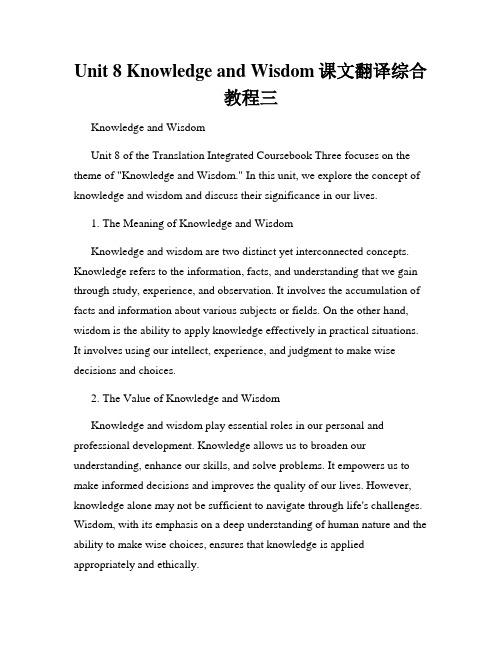
Unit 8 Knowledge and Wisdom课文翻译综合教程三Knowledge and WisdomUnit 8 of the Translation Integrated Coursebook Three focuses on the theme of "Knowledge and Wisdom." In this unit, we explore the concept of knowledge and wisdom and discuss their significance in our lives.1. The Meaning of Knowledge and WisdomKnowledge and wisdom are two distinct yet interconnected concepts. Knowledge refers to the information, facts, and understanding that we gain through study, experience, and observation. It involves the accumulation of facts and information about various subjects or fields. On the other hand, wisdom is the ability to apply knowledge effectively in practical situations. It involves using our intellect, experience, and judgment to make wise decisions and choices.2. The Value of Knowledge and WisdomKnowledge and wisdom play essential roles in our personal and professional development. Knowledge allows us to broaden our understanding, enhance our skills, and solve problems. It empowers us to make informed decisions and improves the quality of our lives. However, knowledge alone may not be sufficient to navigate through life's challenges. Wisdom, with its emphasis on a deep understanding of human nature and the ability to make wise choices, ensures that knowledge is applied appropriately and ethically.Throughout history, humans have demonstrated a relentless pursuit of knowledge and wisdom. From ancient philosophers to modern scientists, the thirst for knowledge has led to significant discoveries and breakthroughs. This pursuit involves continuous learning, questioning, and seeking new perspectives. It also necessitates critical thinking and the ability to discern accurate information from falsehoods. Wisdom, in contrast, is acquired through experience and reflection. It requires self-awareness, empathy, and an ability to recognize patterns and anticipate outcomes.4. Knowledge and Wisdom in Different FieldsKnowledge and wisdom are applicable in various disciplines and areas of life. In academia, knowledge is acquired through rigorous study and research, while wisdom is developed through critical thinking and application of knowledge. In professions such as medicine and engineering, both knowledge and wisdom are crucial for making informed decisions and solving complex problems. In personal relationships, wisdom helps us navigate emotional dynamics and make sound judgments.5. Cultivating Knowledge and WisdomCultivating knowledge and wisdom is an ongoing process that requires dedication and effort. It starts with a thirst for learning and a commitment to continuous self-improvement. Reading books, attending seminars, and engaging in intellectual discussions can expand our knowledge base. Additionally, wisdom can be developed by reflecting on past experiences, seeking guidance from mentors, and practicing empathy and self-awareness.The acquisition and application of knowledge and wisdom have transformative effects on individuals and societies. Knowledge has driven technological advancements, scientific breakthroughs, and societal progress. It has the potential to improve our standard of living, promote equality, and advance global development. Wisdom, with its emphasis on ethical decision-making, can lead to more harmonious relationships, effective leadership, and sustainable solutions to complex problems.In conclusion, knowledge and wisdom are essential for personal and societal growth. While knowledge provides us with information and understanding, wisdom allows us to apply that knowledge effectively and ethically. The pursuit of knowledge and wisdom is a lifelong endeavor that enriches our lives and contributes to the betterment of society. Let us continue striving for knowledge and cultivating wisdom in our journey towards a more enlightened and fulfilling existence.。
论知识与智慧--罗素-knowledge-and-wisdom-译文
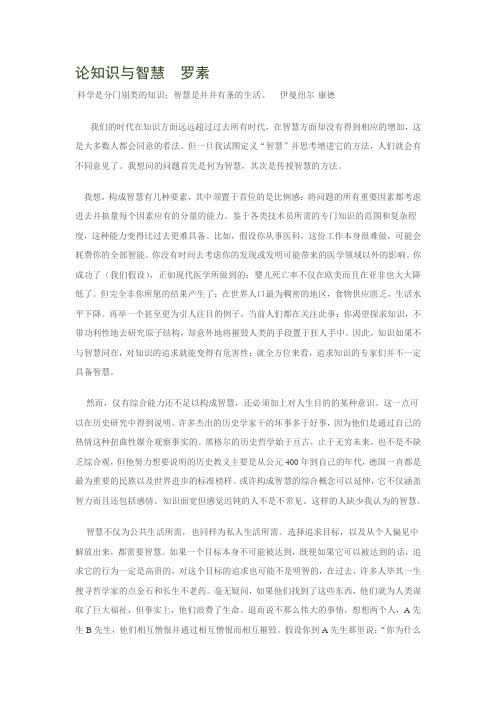
论知识与智慧罗素科学是分门别类的知识;智慧是井井有条的生活。
--伊曼纽尔·康德我们的时代在知识方面远远超过过去所有时代,在智慧方面却没有得到相应的增加,这是大多数人都会同意的看法。
但一旦我试图定义“智慧”并思考增进它的方法,人们就会有不同意见了。
我想问的问题首先是何为智慧,其次是传授智慧的方法。
我想,构成智慧有几种要素,其中须置于首位的是比例感:将问题的所有重要因素都考虑进去并掂量每个因素应有的分量的能力。
鉴于各类技术员所需的专门知识的范围和复杂程度,这种能力变得比过去更难具备。
比如,假设你从事医科,这份工作本身很难做,可能会耗费你的全部智能。
你没有时间去考虑你的发现或发明可能带来的医学领域以外的影响。
你成功了(我们假设),正如现代医学所做到的:婴儿死亡率不仅在欧美而且在亚非也大大降低了。
但完全非你所愿的结果产生了:在世界人口最为稠密的地区,食物供应匮乏,生活水平下降。
再举一个甚至更为引人注目的例子,当前人们都在关注此事:你渴望探求知识,不带功利性地去研究原子结构,却意外地将摧毁人类的手段置于狂人手中。
因此,知识如果不与智慧同在,对知识的追求就能变得有危害性;就全方位来看,追求知识的专家们并不一定具备智慧。
然而,仅有综合能力还不足以构成智慧,还必须加上对人生目的的某种意识。
这一点可以在历史研究中得到说明。
许多杰出的历史学家干的坏事多于好事,因为他们是通过自己的热情这种扭曲性媒介观察事实的。
黑格尔的历史哲学始于亘古,止于无穷未来,也不是不缺乏综合观,但他努力想要说明的历史教义主要是从公元400年到自己的年代,德国一直都是最为重要的民族以及世界进步的标准榜样。
或许构成智慧的综合概念可以延伸,它不仅涵盖智力而且还包括感情。
知识面宽但感觉迟钝的人不是不常见。
这样的人缺少我认为的智慧。
智慧不仅为公共生活所需,也同样为私人生活所需。
选择追求目标,以及从个人偏见中解放出来,都需要智慧。
如果一个目标本身不可能被达到,既便如果它可以被达到的话,追求它的行为一定是高贵的,对这个目标的追求也可能不是明智的,在过去,许多人毕其一生搜寻哲学家的点金石和长生不老药。
Unit 8 Knowledge and Wisdom课文翻译综合教程三

Unit 8 Knowledge and Wisdom课文翻译综合教程三Unit 8: Knowledge and Wisdom (abridged)XXXMost people agree that。
although our age far surpasses all us ages in knowledge。
there has been no corresponding XXX。
agreement XXX "wisdom" and consider means of promoting it。
In this article。
I will first explore what wisdom is and then discuss XXX it.Defining WisdomXXX to define because it passes a broad range of qualities。
Some may define wisdom as the ability to make sound XXX and knowledge。
Others may view wisdom as a state of being that involves a deep understanding of the world and one's place in it.XXX WisdomXXX it involves more than just imparting knowledge。
It requires XXX。
critical thinkingXXX.The Role of nXXX。
XXX of knowledge rather than the development of wisdom。
To promote wisdom。
n should emphasize critical thinking。
- 1、下载文档前请自行甄别文档内容的完整性,平台不提供额外的编辑、内容补充、找答案等附加服务。
- 2、"仅部分预览"的文档,不可在线预览部分如存在完整性等问题,可反馈申请退款(可完整预览的文档不适用该条件!)。
- 3、如文档侵犯您的权益,请联系客服反馈,我们会尽快为您处理(人工客服工作时间:9:00-18:30)。
Knowledge and WisdomBertrand Russell------------------------------------------------------------------------Most people would agree that, although our age far surpasses all previous ages in knowledge, there has been no correlative increase in wisdom. But agreement ceases as soon as we attempt to define `wisdom' and consider means of promoting it. I want to ask first what wisdom is, and then what can be done to teach it.我们的时代在知识方面远远超过过去所有时代,在智慧方面却没有得到相应的增加,这是大多数人都会同意的看法。
但一旦我试图定义“智慧”并思考增进它的方法,人们就会有不同意见了。
我想问的问题首先是何为智慧,其次是传授智慧的方法。
There are, I think, several factors that contribute to wisdom. Of these I should put first a sense of proportion: the capacity to take account of all the important factors in a problem and to attach to each its due weight. This has become more difficult than it used to be owing to the extent and complexity of the specialized knowledge required of various kinds of technicians. Suppose, for example, that you are engaged in research in scientific medicine. The work is difficult and is likely to absorb the whole of your intellectual energy. You have not time to consider the effect which your discoveries or inventions may have outside the field of medicine. You succeed (let us say), as modern medicine has succeeded, in enormously lowering the infant death-rate, not only in Europe and America, but also in Asia and Africa. This has the entirely unintended result of making the food supply inadequate and lowering the standard of life in the most populous parts of the world. To take an even more spectacular example, which is in everybody's mind at the present time: You study the composistion of the atom from a disinterested desire for knowledge, and incidentally place in the hands of powerful lunatics the means of destroying the human race. In such ways the pursuit of knowledge may become harmful unless it is combined with wisdom; and wisdom in the sense of comprehensive vision is not necessarily present in specialists in the pursuit of knowledge.我想,构成智慧有几种要素,其中须置于首位的是比例感:将问题的所有重要因素都考虑进去并掂量每个因素应有的分量的能力。
鉴于各类技术员所需的专门知识的范围和复杂程度,这种能力变得比过去更难具备。
比如,假设你从事医科,这份工作本身很难做,可能会耗费你的全部智能。
你没有时间去考虑你的发现或发明可能带来的医学领域以外的影响。
你成功了(我们假设),正如现代医学所做到的:婴儿死亡率不仅在欧美而且在亚非也大大降低了。
但完全非你所愿的结果产生了:在世界人口最为稠密的地区,食物供应匮乏,生活水平下降。
再举一个甚至更为引人注目的例子,当前人们都在关注此事:你渴望探求知识,不带功利性地去研究原子结构,却意外地将摧毁人类的手段置于狂人手中。
因此,知识如果不与智慧同在,对知识的追求就能变得有危害性;就全方位来看,追求知识的专家们并不一定具备智慧。
Comprehensiveness alone, however, is not enough to constitute wisdom. There must be, also, a certain awareness of the ends of human life. This may be illustrated by the study of history. Many eminent historians have done more harm than good because they viewed facts through the distorting medium of their own passions. Hegel had a philosophy of history which did not suffer from any lack of comprehensiveness, since it started from the earliest times and continued into an indefinite future. But the chief lesson of history which he sought to unculcate was that from theyear 400AD down to his own time Germany had been the most important nation and the standard-bearer of progress in the world. Perhaps one could stretch the comprehensiveness that contitutes wisdom to include not only intellect but also feeling. It is by no means uncommon to find men whose knowledge is wide but whose feelings are narrow. Such men lack what I call wisdom.然而,仅有综合能力还不足以构成智慧,还必须加上对人生目的的某种意识。
这一点可以在历史研究中得到说明。
许多杰出的历史学家干的坏事多于好事,因为他们是通过自己的热情这种扭曲性媒介观察事实的。
黑格尔的历史哲学始于亘古,止于无穷未来,也不是不缺乏综合观,但他努力想要说明的历史教义主要是从公元400年到自己的年代,德国一直都是最为重要的民族以及世界进步的标准榜样。
或许构成智慧的综合概念可以延伸,它不仅涵盖智力而且还包括感情。
知识面宽但感觉迟钝的人不是不常见。
这样的人缺少我认为的智慧。
It is not only in public ways, but in private life equally, that wisdom is needed. It is needed in the choice of ends to be pursued and in emancipation from personal prejudice. Even an end which it would be noble to pursue if it were attainable may be pursued unwisely if it is inherently impossible of achievement. Many men in past ages devoted their lives to a search for the philosopher's stone and the elixir of life. No doubt, if they could have found them, they would have conferred great benefits upon mankind, but as it was their lives were wasted. To descend to less heroic matters, consider the case of two men, Mr A and Mr B, who hate each other and, through mutual hatred, bring each other to destruction. Suppose you dgo the Mr A and say, 'Why do you hate Mr B?' He will no doubt give you an appalling list of Mr B's vices, partly true, partly false. And now suppose you go to Mr B. He will give you an exactly similar list of Mr A's vices with an equal admixture of truth and falsehood. Suppose you now come back to Mr A and say, 'You will be surprised too learn that Mr B says the same things about you as you say about him', and you go to Mr B and make a similar speech. The first effect, no doubt, will be to increase their mutual hatred, since each will be so horrified by the other's injustice. But perhaps, if you have sufficient patience and sufficient persuasiveness, you may succeed in convincing each that the other has only the normal share of human wickedness, and that their enmity is harmful to both. If you can do this, you will have instilled some fragment of wisdom.智慧不仅为公共生活所需,也同样为私人生活所需。
